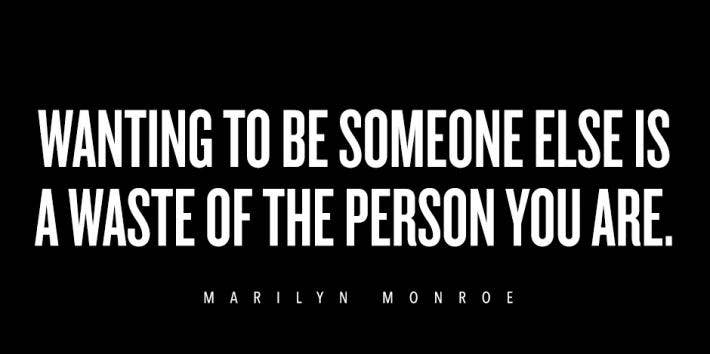
Go ahead and love yourself. Your body will thank you!
By Katherine Agranovich — Written on Dec 10, 2016
Photo: Pixabay

“You’re not going to believe this,” my close friend told me over coffee, “but the only time I get to really rest is during my chemotherapy treatments.”
Every hair on my body stood at attention, shocked.
“No seriously,” she continued, “ever since I was diagnosed with breast cancer, I noticed that only then do I allow myself to relax! It’s like I have a reason now, an excuse. I’m not being lazy; it’s justified because I’m sick.”
As shocked as I was to hear those words from this super soccer mom of three boys and busy physician, I realized she was right when, two days later, I broke my pinky toe and my body forced me to stay in bed.
With my foot propped up on a pillow and my brain stupefied by pain, I spent my time watching brainless shows on Netflix. Just like my friend, there‘s no way in heaven or hell that I would let myself get this lazy if I hadn't broke my toe.
Thinking about this has made me question my core beliefs about self-care.
I realized that, apparently, I don’t have any. My days consist of doing the things that MUST be done — for the house, for the kids, for my husband, for our parents, and for our pets. Occasionally, I’ll storm into a salon to make my face, hair, and nails look presentable.
Massages? Only when something hurts. Chiropractor? When a massage doesn’t help and my body still hurts.
But do I really have to wait until my body screams in agony for me to slow down? Do I need to be told to acknowledge this vehicle of flesh and bones? Wouldn’t it be smarter to prevent the crisis and offer my body the care it deserves before it develops symptoms and I'm forced to pay attention?
Logically, I should I know the answers. I should follow my body’s cues, which are always communicated to me through my emotions. So, why don’t I? What makes me so unwilling to change?
In short — my own mentality.
As a holistic doctor, I know that our mindset affects our health.
The medical community has finally recognized the undeniable connection between emotions and physical health. While once considered folklore, today there are numerous clinical studies published in medical journals that back up this ancient wisdom.
Even without the current data on stress and disease, I can testify to this connection based on my own life experience. When I feel frustrated and do nothing about my negative emotions, my stomach hurts. When I feel anger and resentment, my gallbladder starts playing football with its stones. When I feel pressure to complete all of my tasks by the end of the day, I get a migraine.
Lately, I’ve felt overwhelmed for several legitimate reasons, including:
- An endless kitchen and master bathroom renovation
- Managing kids spread across three different schools
- Fatigue caused by a chronic lack of sleep (because my youngest still wakes me for 3:00 AM snuggles)
And yet, I’ve ignored the emotional state in which this has placed me.
Sure, I could tell myself soft words of reassurance. I could try to calm myself down, as I would a child. I could tell myself, “In the end, things always work out. Eventually, you’ll have the kitchen of your dreams. You can handle this. It's just temporary. Go with a flow. You are capable and strong. Besides, it makes no sense to feel upset. It won’t solve the situation."
But knowing better doesn’t cut it.
I have to put my knowledge into practice in order for it to work. Instead, the stress accumulates, and as a result, my mental clarity diminishes. As I jump out of bed first thing in the morning to greet the construction workers, make my boys breakfast, and pack their snacks, I swing the door open — and right onto my pinky toe. Boom!
I hear my body crack. Still, I ignore it. I keep running until I collapse in front of the fridge howling in pain.
Now I'm lying in bed as I shiver in agony, immobile. I consider what to make of this turn of events.
Could it be that life is presenting me with an opportunity to reconsider my approach to living? Should I stop my crazy life from spinning, or even slow it down? Ought I establish, instead, my position in the midst of the chaos.
Sure, I could waste this opportunity like I’ve done so many times before.
I could turn to my well-practiced and familiar habits, such as:
- Hating myself for being so stupid and clumsy
- Hating my husband for not helping me with the kids in the morning
- Hating my mom for not offering help by taking my kids for the weekend
- Hating the feeling that no one and nothing gives me a break
Instead, I gave myself a break. Literally.
I know that if I stay in this hateful, blameful, judgmental, and emotional mode, I’ll delay my own healing. I believe that our bodies are impacted by our state of mind and that our healing process depends hugely on our emotional state.
So I have to decide which I want: to heal slowly or get well fast?
I choose the latter, but in order to achieve this, I need to clear the path to my goal by getting my old emotional baggage out of the way.
For that to happen, I need to give up at least these 5 things:
1. My prideful need to handle everything myself.
The real reason I'm the only one who cleans, cooks, folds laundry, loads the dishwasher and feeds my kids is that I don’t trust others to do as good a job at any of these tasks as I can.
2. My resentments toward people for not offering to me help.
I must recognize and accept that they gave up on offering me help a long time ago — because I never accepted it when they tried.
3. My thinking that I have to stay productive in order to justify my existence and earn my own self-respect.
Just because I was raised to believe this way, that doesn’t make it true. What if being in a state of happiness, love, and joy is my true purpose?
4. My need to have control over things that are none of my business.
Such as my sister finally deciding to get married, my father quitting smoking, my 10-year-old eating broccoli, and the President granting maternity leave to self-employed moms. I can still care deeply about these things without stressing over them excessively and ruining my health.
Related Stories From YourTango:
5. My thoughts caused by low-self esteem, such as "I am not good enough, worthy enough or deserving enough to be happy and enjoy my life."
Even with a messy kitchen, screaming kids, and a broken toe, I can still choose happiness by focusing on things I am grateful for — and if I make myself look, there are many.
During an appearance on “The Ellen DeGeneres Show,” Lady Gaga was asked if she had any vacation plans, to which the superstar replied, “I didn’t join show business to sit under a palm tree ...”
A few months later, she canceled her show due to bronchitis.
Taking care of the self is important and should be a priority. Yet, so often, many of us fail to do so.
Instead, some run around trying to prove non-existent points, compensating for an illusionary lack — all to justify their right to breathe and take up space.
That is until the body fails and is forced to go through the dirty laundry of its emotions in order to heal itself. Our minds must hold onto the useful ones — such as optimism, kindness — and let go of the toxic ones — such as overwhelm and resentment — before it's too late and our cells become infused with the energy of disease beyond the point of no-return.
Wise people call this “mindfulness," or mindful living.
And after years of assisting my clients in building healthy self-esteem based on self-love and respect, it’s finally my turn to practice what I preach.
Katherine Agranovich, Ph.D., is a Medical Hypnotherapist and Holistic Consultant. She is the author of Tales of My Large, Loud, Spiritual Family. Call her for an office or phone consultation to attain mental-emotional alignment and close the gap between where you are and where you want to be.

